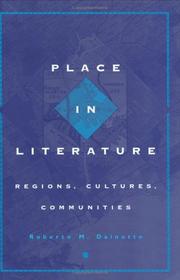| Listing 1 - 9 of 9 |
Sort by
|

ISBN: 0801436834 Year: 2000 Publisher: Ithaca, NY London Cornell University Press
Abstract | Keywords | Export | Availability | Bookmark
 Loading...
Loading...Choose an application
- Reference Manager
- EndNote
- RefWorks (Direct export to RefWorks)
Cadre (Littérature) --- Cadre du récit littéraire --- Communauté dans la littérature --- Communities in literature --- Community in literature --- Couleur locale dans la littérature --- Couleur locale in de literatuur --- Culture dans la littérature --- Culture in literature --- Cultuur in de literatuur --- Espace et temps (Littérature) --- Gemeenschap in de literatuur --- Lieu (Philosophie) dans la littérature --- Littérature régionaliste --- Local color in literature --- Plaats (Filosofie) in de literatuur --- Place (Philosophy) in literature --- Regionalism in literature --- Setting (Literature) --- Setting (Literatuur) --- Streekliteratuur --- Community in literature. --- Culture in literature. --- English fiction --- Italian fiction --- Local color in literature. --- Place (Philosophy) in literature. --- Regionalism in literature. --- History and criticism. --- Setting (Literature). --- 19th century --- History and criticism --- Hardy, Thomas --- Settings --- Gaskell, Elizabeth Cleghorn --- Love in literature --- Gaskell, Elizabeth Cleghorn, - 1810-1865 - Settings. --- Italian fiction - 19th century - History and criticism.
Book
ISBN: 9781780234434 Year: 2015 Publisher: London Reaktion Books
Abstract | Keywords | Export | Availability | Bookmark
 Loading...
Loading...Choose an application
- Reference Manager
- EndNote
- RefWorks (Direct export to RefWorks)

ISBN: 0822339056 0822339277 9786613023094 1283023091 0822389622 Year: 2007 Publisher: Durham : Duke University Press,
Abstract | Keywords | Export | Availability | Bookmark
 Loading...
Loading...Choose an application
- Reference Manager
- EndNote
- RefWorks (Direct export to RefWorks)
A postcolonial study of eighteenth-and nineteenth-century theorizations that have informed the dominant idea of Europe, a concept that has marginalized the southern "other" within it's own borders.
National characteristics, European. --- European national characteristics --- Europe --- Civilization. --- Intellectual life --- Historiography. --- Papacy --- History --- Dictionaries --- German. --- Holy See --- See, Holy --- Popes --- Philosophy --- Theory --- Culture --- Politics --- Eurocentrism --- Imperialism
Book
ISBN: 147809141X Year: 2007 Publisher: Durham, NC : Duke University Press,
Abstract | Keywords | Export | Availability | Bookmark
 Loading...
Loading...Choose an application
- Reference Manager
- EndNote
- RefWorks (Direct export to RefWorks)
Europe (in Theory) is an innovative analysis of eighteenth- and nineteenth-century ideas about Europe that continue to inform thinking about culture, politics, and identity today. Drawing on insights from subaltern and postcolonial studies, Roberto M. Dainotto deconstructs imperialism not from the so-called periphery but from within Europe itself. He proposes a genealogy of Eurocentrism that accounts for the way modern theories of Europe have marginalized the continent's own southern region, portraying countries including Greece, Italy, Spain, and Portugal as irrational, corrupt, and clan-based in comparison to the rational, civic-minded nations of northern Europe. Dainotto argues that beginning with Montesquieu's The Spirit of Laws (1748), Europe not only defined itself against an “Orientalâ€_x009d_ other but also against elements within its own borders: its South.
Literary Criticism / Semiotics & Theory --- Literature --- History and criticism --- Appraisal of books --- Books --- Evaluation of literature --- Criticism --- Literary style --- Appraisal --- Evaluation --- History and criticism.
Multi
ISBN: 9780822389620 9781283023092 9781478091417 147809141X Year: 2007 Publisher: Durham, NC : Duke University Press,
Abstract | Keywords | Export | Availability | Bookmark
 Loading...
Loading...Choose an application
- Reference Manager
- EndNote
- RefWorks (Direct export to RefWorks)
Europe (in Theory) is an innovative analysis of eighteenth- and nineteenth-century ideas about Europe that continue to inform thinking about culture, politics, and identity today. Drawing on insights from subaltern and postcolonial studies, Roberto M. Dainotto deconstructs imperialism not from the so-called periphery but from within Europe itself. He proposes a genealogy of Eurocentrism that accounts for the way modern theories of Europe have marginalized the continent's own southern region, portraying countries including Greece, Italy, Spain, and Portugal as irrational, corrupt, and clan-based in comparison to the rational, civic-minded nations of northern Europe. Dainotto argues that beginning with Montesquieu's The Spirit of Laws (1748), Europe not only defined itself against an “Orientalâ€_x009d_ other but also against elements within its own borders: its South.
Literary Criticism / Semiotics & Theory --- Literature --- History and criticism.
Book
ISBN: 1780234724 9781780234724 Year: 2015 Publisher: London, England : Reaktion Books,
Abstract | Keywords | Export | Availability | Bookmark
 Loading...
Loading...Choose an application
- Reference Manager
- EndNote
- RefWorks (Direct export to RefWorks)
What makes Tony Soprano so likeable? Why would we rather leave the cannoli and take the gun? Do we truly want Scarface's Tony Montana to succeed? Is Michael Corleone a misunderstood hero or a despicable villain? Roberto Dainotto traces the complex and fascinating development of the Mafia: its rural beginnings in Western Sicily; its growth into what has been aptly described as a global multinational of crime; and its parallel evolution in music, print and on the big screen. The book probes the tension between the real Mafia - its brutal and often violent reality - and how we imagine it to be: a mythical assembly of codes of honour, family values and chivalric masochism. Rather than dismissing such Mafia stereotypes as untrue, Dainotto sets out to understand what needs and desires, material and psychic longings, are satisfied by our Mafia fantasies. Exploring the rich array of films, books, television, music and even video games portraying and inspired by the Mafia, this book offers not only a social, economic and political history of the Mafia but a new way of understanding our enduring fascination with what lurks behind the sinister omerta of the family business.
Organized crime. --- Mafia in motion pictures. --- Mafia in literature.
Multi
ISBN: 9781478012146 9781478007999 9781478008491 Year: 2020 Publisher: Durham, N.C. Duke University Press
Abstract | Keywords | Export | Availability | Bookmark
 Loading...
Loading...Choose an application
- Reference Manager
- EndNote
- RefWorks (Direct export to RefWorks)
Antonio Gramsci's Prison Notebooks have offered concepts, categories, and political solutions that have been applied in a variety of social and political contexts, from postwar Italy to the insurgencies of the Arab Spring. The contributors to Gramsci in the World examine the diverse receptions and uses of Gramscian thought, highlighting its possibilities and limits for understanding and changing the world. Among other topics, they explore Gramsci's importance to Caribbean anticolonial thinkers like Stuart Hall, his presence in decolonial indigenous movements in the Andes, and his relevance to understanding the Chinese Left. The contributors consider why Gramsci has had relatively little impact in the United States while also showing how he was a major force in pushing Marxism beyond Europe—especially into the Arab world and other regions of the Global South. Rather than taking one interpretive position on Gramsci, the contributors demonstrate the ongoing relevance of his ideas to revolutionary theory and praxis.
Gramsci, Antonio --- Philosophie politique. --- Gramsci, Antonio, --- Critique et interprétation.
Book
ISBN: 1478012145 1478007990 1478008490 Year: 2020 Publisher: Durham : Duke University Press,
Abstract | Keywords | Export | Availability | Bookmark
 Loading...
Loading...Choose an application
- Reference Manager
- EndNote
- RefWorks (Direct export to RefWorks)
"The contributors to Gramsci in the World examine the varying receptions and uses of Antonio Gramsci's thought in diverse geographical, historical, and political contexts, highlighting its possibilities and limits for understanding and changing the social world."--
Marxian historiography. --- Communism --- Philosophy, Marxist. --- History. --- Gramsci, Antonio, --- Political and social views.
Digital

ISBN: 9783839421147 9783837621143 Year: 2014 Publisher: Bielefeld transcript Verlag
Abstract | Keywords | Export | Availability | Bookmark
 Loading...
Loading...Choose an application
- Reference Manager
- EndNote
- RefWorks (Direct export to RefWorks)
| Listing 1 - 9 of 9 |
Sort by
|

 Search
Search Feedback
Feedback About UniCat
About UniCat  Help
Help News
News